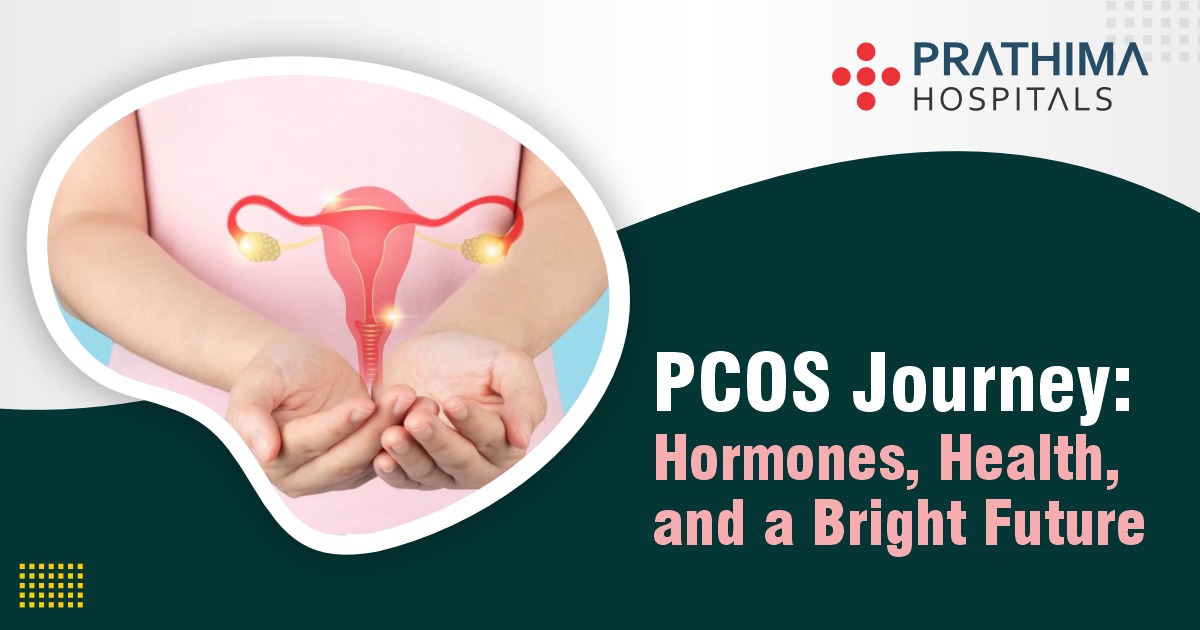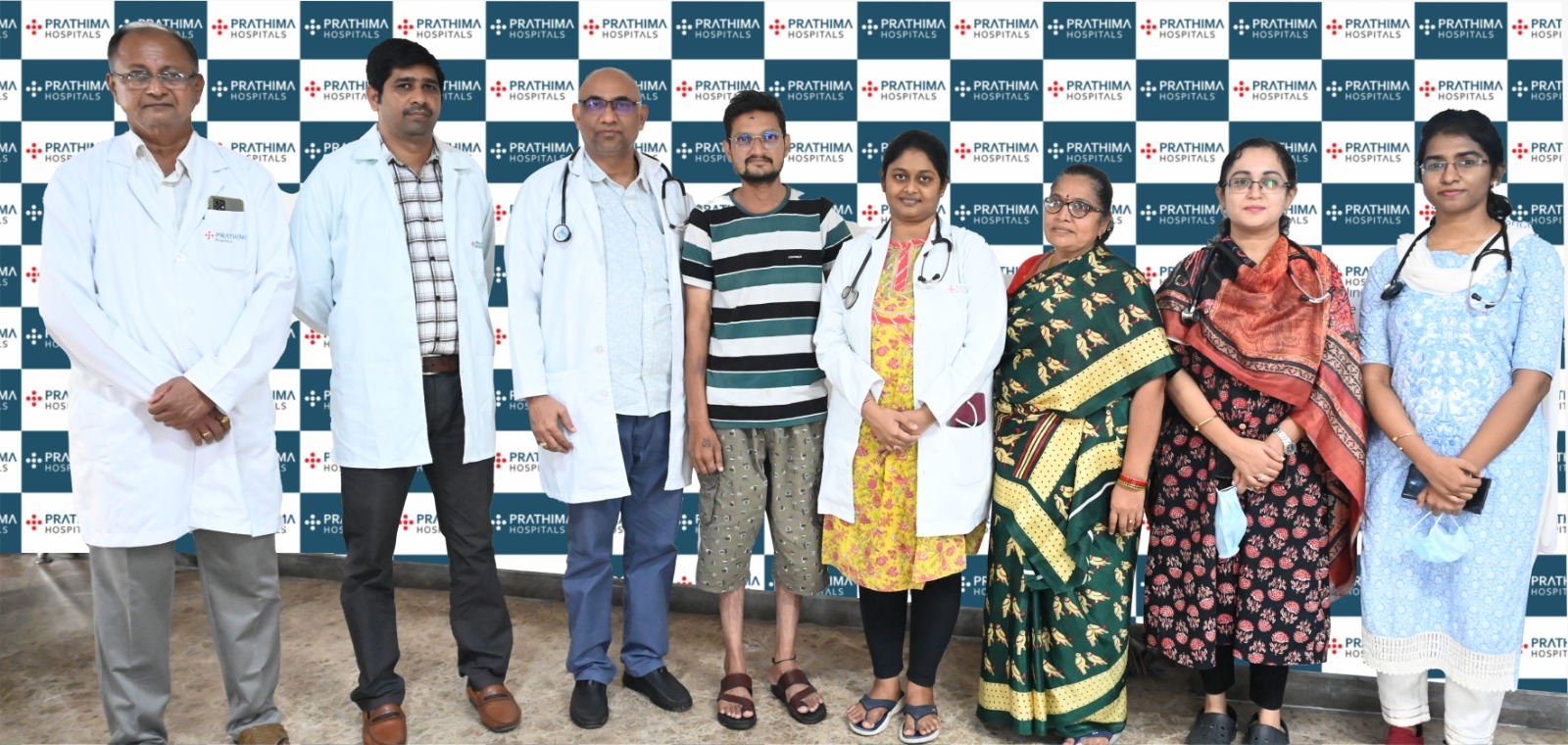How PCOS Works: Causes, Symptoms, and Solutions!

Polycystic Ovary Syndrome (PCOS)
Introduction:
Polycystic Ovary Syndrome, commonly referred to as PCOS, is a complex and prevalent endocrine disorder that affects millions of women worldwide. According to the Best Gynecologist in Hyderabad, it is a condition that impacts not only physical health but also emotional and psychological well-being.
The month of September is International Polycystic Ovary Syndrome Awareness Month, so here we will explore the many aspects of PCOS, such as its causes, symptoms, diagnosis, treatment options, as well as its impact on women’s lives and current developments in research and management.
I. What is Polycystic Ovary Syndrome (PCOS)?
Polycystic Ovary Syndrome is a hormonal disorder characterized by a range of symptoms, often including irregular menstrual cycles, elevated levels of androgens (male hormones), and the presence of multiple small cysts on the ovaries. While the exact cause of PCOS remains elusive, it is believed to be influenced by a combination of genetic and environmental factors.
A. Polycystic Ovary Syndrome (PCOS) and Hormonal Imbalance:
PCOS is fundamentally a hormonal disorder, and its hallmark is an imbalance in sex hormones. In women without PCOS, the ovaries produce a precise balance of estrogen and progesterone, which regulate the menstrual cycle.
In PCOS, this balance is disrupted, leading to an overproduction of androgens, such as testosterone, and an underproduction of progesterone. This hormonal imbalance can trigger a cascade of symptoms and complications.
II. What Causes Polycystic Ovary Syndrome (PCOS)?
The exact cause of PCOS is not fully understood, but researchers have identified several factors that contribute to its development. Genetics and the environment are believed to contribute to the development of this disease. Some of the primary factors include:
A. Genetic Predisposition:
PCOS often exhibits a familial pattern, suggesting a genetic influence in its development. Women with a family history of the disorder are at great risk of growing it themselves. Researchers are actively studying the specific genes that may be associated with PCOS.
B. Insulin Resistance:
Insulin resistance is another key factor in Polycystic Ovary Syndrome development. Insulin serves as a hormone responsible for the regulation of blood sugar levels.
In some cases of PCOS, the body’s cells become resistant to the effects of insulin, leading to higher insulin levels in the blood. This can trigger the ovaries to produce more androgens, contributing to the hormonal imbalance seen in PCOS.
C. Hormonal Imbalance:
The hormonal imbalance in Polycystic Ovary Syndrome involves an excess of androgens, which are typically considered male hormones but are present in both men and women. This excess androgen production can disrupt normal ovarian function and lead to the development of cysts on the ovaries.
III. Symptoms of Polycystic Ovary Syndrome (PCOS):
PCOS presents with a wide range of symptoms, and the severity and combination of these symptoms can vary from one individual to another. Common symptoms include:
A. Irregular Menstrual Cycles:
One of the most prevalent symptoms of Polycystic Ovary Syndrome is irregular or absent menstrual periods. PCOS may affect women’s menstrual cycles in an infrequent, heavy, or prolonged manner. Some may go months without a period, making it challenging to predict ovulation and plan for pregnancy.
B. Ovulation Dysfunction:
PCOS often causes anovulation, which means that the ovaries do not release eggs regularly or at all as said by the Best Gynecologist in Kukatpally. This can lead to infertility or difficulty conceiving for women with PCOS who are trying to get pregnant.
C. Excessive Hair Growth (Hirsutism):
Increased androgen levels can lead to hirsutism, which is the growth of coarse, dark hair on areas of the body where men typically grow hair, such as the face, chest, and back. This can be emotionally distressing for many women with PCOS.
D. Acne and Oily Skin:
Elevated androgen levels can also contribute to acne and excessively oily skin. Acne can be severe and difficult to manage in some cases.
E. Hair Thinning:
While there is excessive hair growth in some areas, women with PCOS may also experience thinning of the hair on the scalp, a condition known as female pattern baldness.
F. Weight Gain and Difficulty Losing Weight:
Many women with PCOS struggle with weight management. Insulin resistance, along with hormonal imbalances, can make it easier to gain weight and harder to lose it.
G. Skin Darkening (Acanthosis Nigricans):
Acanthosis nigricans is a condition in which dark, thickened patches of skin develop, often in the neck, armpits, or groin. It is more common in individuals with insulin resistance, which frequently accompanies PCOS.
H. Mood Disorders:
In addition to affecting mental health, PCOS can also affect physical health. Some women with PCOS report increased levels of anxiety, depression, and mood swings.
IV. Diagnosis of Polycystic Ovary Syndrome (PCOS):
Diagnosing Polycystic Ovary Syndrome can be complex, as it is based on a combination of clinical symptoms, medical history, and laboratory tests. There is no single definitive test for PCOS, and the diagnosis relies on the exclusion of other conditions with similar symptoms. To diagnose PCOS, a healthcare provider typically follows these steps:
A. Medical History and Physical Examination:
The healthcare provider will begin by taking a detailed medical history, including menstrual patterns, family history of PCOS, and any other relevant information. A physical examination may also be conducted to check for physical signs of PCOS, such as hirsutism or acanthosis nigricans.
B. Blood Tests:
Blood tests are used to measure hormone levels, including testosterone, luteinizing hormone (LH), and follicle-stimulating hormone (FSH). Elevated levels of testosterone and a higher LH-to-FSH ratio are common findings in women with PCOS.
C. Pelvic Ultrasound:
A pelvic ultrasound may be performed to visualize the ovaries and check for the presence of multiple small cysts. However, the absence of cysts on the ovaries does not rule out PCOS, as not all women with the condition have this characteristic feature.
D. Ruling Out Other Conditions:
The healthcare provider may also conduct tests to rule out other conditions that can mimic PCOS symptoms, such as thyroid disorders, hyperprolactinemia, or non-classical congenital adrenal hyperplasia.
To receive a diagnosis of PCOS, a woman typically needs to meet specific criteria established by medical organizations like the Rotterdam criteria. These criteria include the presence of two out of three key features: irregular or absent menstrual cycles, elevated androgen levels, and the presence of polycystic ovaries on ultrasound.
V. PCOS and Its Impact on Health:
PCOS is not merely a reproductive disorder; it can have significant implications for a woman’s overall health and well-being. Understanding these health risks is crucial for effectively managing the condition and mitigating potential complications.
A. Fertility Issues:
Women with PCOS often struggle with fertility due to anovulation or irregular ovulation. However, fertility treatments, such as ovulation induction or in vitro fertilization (IVF), can help many women with PCOS conceive.
B. Insulin Resistance and Type 2 Diabetes:
Insulin resistance is a common feature of PCOS. Over time, if left unmanaged, it can lead to the development of type 2 diabetes. Managing insulin resistance through lifestyle changes and medications can reduce this risk.
C. Cardiovascular Health:
Women with PCOS are at an increased risk of cardiovascular disease, including hypertension, high cholesterol, and heart disease. Lifestyle modifications, such as a healthy diet and regular exercise, are essential for mitigating these risks.
D. Metabolic Syndrome:
PCOS is closely associated with metabolic syndrome, a cluster of conditions that increase the risk of heart disease, stroke, and type 2 diabetes. Metabolic syndrome includes central obesity, high blood pressure, high blood sugar, and abnormal lipid levels.
E. Endometrial Cancer:
Women with PCOS may have irregular menstrual cycles, which can lead to the buildup of the uterine lining (endometrium). Over time, this can increase the risk of endometrial hyperplasia and endometrial cancer. Regular menstrual cycles can help reduce this risk.
F. Psychological and Emotional Well-being:
According to the Best Gynecologist in Kachiguda, the emotional impact of PCOS should not be underestimated. The condition can lead to feelings of frustration, low self-esteem, and depression, particularly when it affects body image or fertility.
VI. PCOS Treatment and Management:
There is no one-size-fits-all approach to treating PCOS, as the management plan must be tailored to each individual’s specific symptoms, goals, and health status. Treatment for PCOS typically involves addressing the underlying hormonal imbalance, managing symptoms, and minimizing health risks.
A. Lifestyle Modifications:
- Diet: A balanced diet that focuses on whole foods, low glycemic index carbohydrates, lean protein sources, and healthy fats can help manage insulin resistance and support weight management.
- Exercise: Regular physical activity can improve insulin sensitivity, aid in weight management, and promote overall health. Do moderate intensity workout for atleast 150 minutes per week.
- Weight Management: Achieving and maintaining a healthy weight can help improve PCOS symptoms, regulate menstrual cycles, and reduce the risk of complications.
B. Medications:
- Birth Control Pills: Oral contraceptives can regulate menstrual cycles, reduce androgen levels, and improve acne and hirsutism in women with PCOS.
- Anti-Androgen Medications: Medications like spironolactone or finasteride can help manage hirsutism and acne by reducing androgen levels.
- Metformin: This medication is commonly used to treat insulin resistance and may help with weight management and ovulation in women with PCOS.
- Fertility Medications: Clomiphene citrate or letrozole may be prescribed to induce ovulation in women with PCOS who are trying to conceive.
C. Surgical Interventions:
- Ovarian Drilling: In some cases, a surgical procedure called ovarian drilling may be recommended to induce ovulation. It involves making small incisions in the ovaries to reduce androgen production.
D. Psychotherapy and Support: Coping with the emotional and psychological aspects of PCOS is crucial. Psychotherapy or support groups can help women manage stress, anxiety, and depression associated with the condition.
VII. PCOS and Pregnancy:
For women with PCOS who wish to become pregnant, managing the condition is essential. With the right approach, many women with PCOS can conceive and have healthy pregnancies. Here are some considerations:
- Ovulation Induction: Fertility medications like clomiphene citrate or letrozole may be prescribed to induce ovulation.
- Monitoring: Regular monitoring of the menstrual cycle, ovulation, and hormone levels can increase the chances of successful conception.
- Lifestyle Factors: Maintaining a healthy lifestyle, including a balanced diet, regular exercise, and stress management, can improve fertility and pregnancy outcomes.
- High-Risk Pregnancy: Women with PCOS may have a slightly higher risk of gestational diabetes, preeclampsia, and preterm birth. Close monitoring by healthcare providers is essential during pregnancy.
- Postpartum Considerations: Women with PCOS should be aware that hormonal changes during pregnancy and postpartum can affect PCOS symptoms. Some may find that their symptoms improve temporarily after childbirth.
VIII. Recent Advances in PCOS Research:
Ongoing research into PCOS is shedding light on new potential treatments and a deeper understanding of the condition. Some recent developments in PCOS research include:
- Gut Microbiota: Emerging research suggests a connection between gut health and PCOS. Studies have shown that alterations in gut microbiota composition may influence insulin resistance and inflammation in PCOS. Modifying the gut microbiota through diet or probiotics may hold promise as a complementary approach to PCOS management.
- Targeted Therapies: Researchers are exploring targeted therapies that address specific aspects of PCOS, such as reducing androgen levels or improving insulin sensitivity, with fewer side effects than traditional treatments.
IX. Conclusion:
Polycystic Ovary Syndrome is a complex and multifaceted condition that affects millions of women worldwide. While there is no cure for PCOS, early diagnosis and appropriate management can help alleviate symptoms, improve fertility, and reduce the risk of long-term health complications as per the Best Gynecologist in KPHB.
A holistic approach that combines lifestyle modifications, medications, and psychological support can empower women with PCOS to lead healthy and fulfilling lives. As research continues to expand our understanding of PCOS, the future holds promise for more targeted and effective treatments, ultimately improving the quality of life for those affected by this condition.
.
.
.
.
.
For More Details:
📞:: 733 733 6600 | 040 4345 4345
🌐:: https://prathimahospitals.com/book-appointment/



